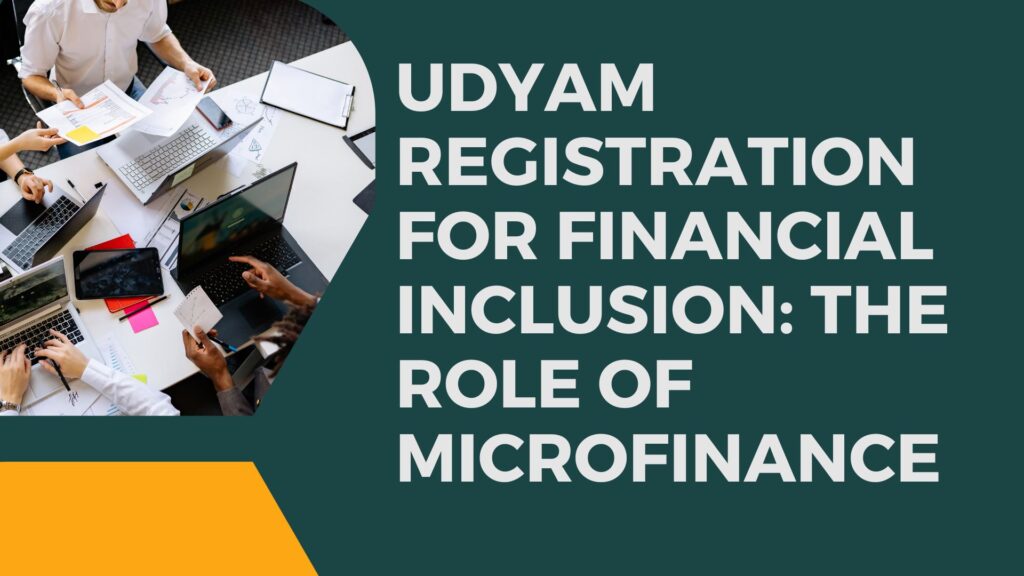The goal of financial inclusion is to provide people and businesses, especially disadvantaged and marginalized communities, access to vital financial services. The Enterprise Registration Service is important for the advancement of financial inclusion in India. The Udyam Registration Portal program provides a platform for small and micro businesses to formally establish their operations. This paper examines the role of microfinance in the contribution of enterprise registration to financial inclusion.
Learning About Financial Inclusion:
Making sure that people and businesses have access to inexpensive and suitable financial products and services, such as savings accounts, credit, insurance, and payment systems, is known as financial inclusion. By giving them the resources to manage their money and make investments in the future, it seeks to economically enlighten individuals, encourage entrepreneurship, and combat poverty.
The formalization of small businesses:
Micro businesses are encouraged to legitimize their operations by Udyam Registration. In order to obtain financial services, this formalization is frequently required.
Government Program Access:
Registered Udyam enterprises have access to a number of government programs and incentives that can help them expand financially.
Increased access to credit
Due to their reputation as trustworthy and legitimate borrowers, banks and microfinance institutions (MFIs) are more inclined to offer credit to registered Udyam firms.
Microfinance’s Function in Financial Inclusion
Particularly in a nation as diverse and populous as India, microfinance is a crucial part of financial inclusion. It entails offering modest loans, savings accounts, and other financial services to people and microbusinesses that are frequently shut out of the traditional banking system. Here are some ways that microfinance promotes financial inclusion:
Accessibility to Credit:
Microfinance institutions (MFIs) give financing to people and microbusiness owners without requiring them to provide collateral or a credit history. As a result, they can start or grow enterprises, spend money on education, and generally live better lives.
Using Up Savings:
By providing people with simple savings solutions, microfinance promotes people to form saving habits. This aids in future planning and the development of financial resilience.
Financial Sensitivity:
MFIs frequently offer financial education to their clients, enabling them to make informed decisions regarding their spending, investing, and debt management.
Remote and rural reach:
In places where traditional banks are underrepresent, including rural and distant communities, microfinance institutions are frequently active. By doing this, it is made sure that even the most underserved populations may access banking services.
Women’s Empowerment:
By giving women access to credit and financial independence, microfinance has a significant impact on gender equality.
Udyam Microfinance and Registration:
By acting as a link between microbusinesses and microfinance organizations, Udyam Registration promotes financial inclusion. Here is how these two components interact:
Credibility:
Micro-enterprises are more credible thanks to Udyam Registration, which increases their appeal to MFIs. It offers proof of their existence, commercial activity, and dedication to formalization.
Qualifications for Loans:
Registere Udyam businesses are more likely to be approve for microloans, which will aid in their expansion and success.
Access to Grants & Subsidies:
Businesses with Udyam registrations have access to government grants and subsidies, which can help them with additional funding and promote their growth.
Issues and Resolutions:
Even though Udyam Registration and Microfinance play a crucial part in increasing financial inclusion, there are still obstacles to be overcome:
Publicity and Outreach:
Many microbusinesses, particularly those in rural regions, are still uninforme of the Udyam Registration process and available loan options. It will take substantial outreach and education efforts to address this issue.
Computer literacy:
Increasing digital literacy among microbusiness owners is crucial as financial services increasingly shift online. Training courses can aid in closing this gap.
Financial Products Design for You:
Microfinance organizations must to keep creating financial products with small-ticket loans and flexible payback terms to meet the particular requirements of microbusinesses.
Risk Administration:
Since the industry deals with weak borrowers who could experience economic shocks, appropriate risk management strategies are need to ensure the sustainability of microfinance.
The Way Ahead:
Microfinance and Udyam Registration are two steps on the path to financial inclusion. Stakeholders are require to continue promoting this important agenda by:
Innovate:
Embrace technical advancements to more effectively reach underprivileg communities, such as mobile payments and digital banking.
Educate:
Promote entrepreneurship and financial literacy training programs to give micro-entrepreneurs the tools they need to successfully run their enterprises and manage their finances.
Watch and Assess:
Continue to review the efficacy of financial inclusion initiatives and make any require improvements.
See Also : Update Udyam Certificate
Conclusion:
Economic expansion, the eradication of poverty, and social advancement all depend heavily on financial inclusion. By formalizing micro firms and linking them to the financial system, Udyam Registration plays a crucial part in increasing financial inclusion. In this situation, microfinance organizations play a critical role in giving traditionally exclude groups access to credit, savings, and financial education.
Udyam Registration and microfinance work together to empower small businesses, encourage entrepreneurship, and advance economic stability. The cooperation between these two factors will continue to be essential as India moves closer to inclusive economic growth because it will guarantee that all people and enterprises have the chance to prosper and make contributions to the well-being of the country.

